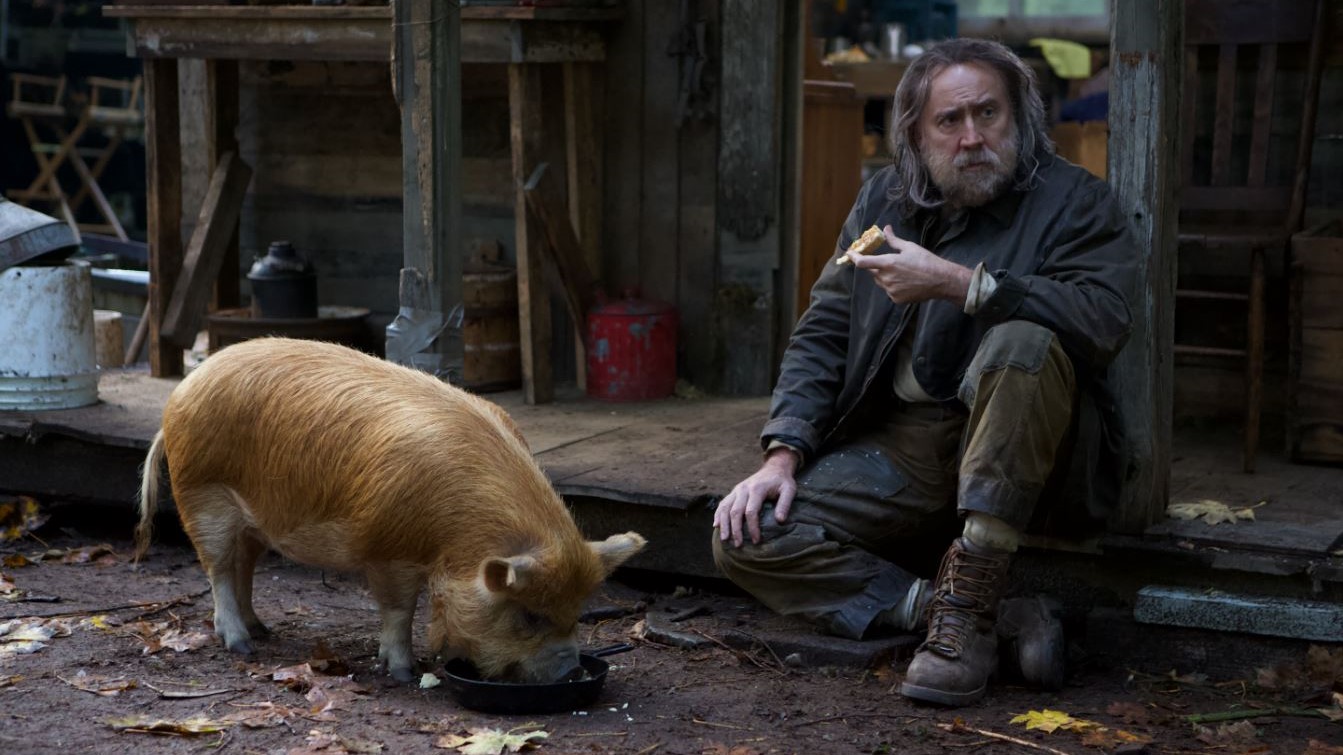What to Watch Verdict
Whether this meal is suited to your palate is something only you can decide, but it’s hard to argue that it isn’t a well-crafted dish.
Pros
- +
🐷 Nicolas Cage gives an all-timer of a performance.
- +
🐷 The tonal balance between dark comedy and philosophical tragedy is like a magic trick.
- +
🐷 That climax is both unexpected and moving.
Cons
- -
🐷 This movie is not terribly interested in universal appeal, especially if you're buying into it as a 'John Wick' clone.
- -
Kinda wish we saw more of that pig. It's a cute pig.
The advertising campaign for writer-director Michael Sarnoski and co-writer Vanessa Block’s new film Pig is a bit misleading. Comparisons have been made to John Wick or previous Nicolas Cage vehicle Mandy based on the very intriguing trailer, and, to be fair, that’s not completely inaccurate to what the film actually is. There is a fair degree of Wick-esque world-building, and the somber, meditative tone is reminiscent of Cage’s work in Mandy. However, the overt stylization of both is entirely absent from Pig, and while it isn’t devoid of violence, there isn’t nearly so much as might be expected in a film that seems so directly inspired by two very action-oriented films. No, Pig has something else on its mind entirely. It’s a film that makes you want to actively contemplate its themes, not to revel in its excess. And yes, it absolutely rises to the occasion on those terms.
Like a truffle hunter, you’ve probably already sniffed out the basic outline of this story. Rob (Cage) is a hermetic truffle hunter who lives with his foraging pig. The only human contact he has is with a young entrepreneur, Amir (Alex Wolff), who shows up in his expensive car to purchase truffles every week, and their relationship is professionally antagonistic at best. However, when Rob’s only friend is pignapped in the dead of night, he has no one else to turn to besides Amir, whose entire truffle enterprise is based on Rob and his pig. So Rob has Amir bring him to Portland to investigate who could have taken the pig, where it quickly becomes clear that there is more to Rob’s past than the antisocial recluse he’s become over the past fifteen years.
It’s by this point that Pig strikes a very specific tonal balance that should feel like a contradiction, but doesn’t. On the one hand, it’s a film about the elaborate underworld of the Portland restaurant scene, not unlike Wick’s Continental Hotel but with chefs instead of assassins. Not assassin chefs. Just chefs. And while the hushed reverence given to Rob’s history is played completely straight, the film obviously has a sense of humor about the more outlandish aspects of its imagined underground culinary network, providing a necessary and appreciated darkly comic undertone.
However, on that conspicuous other hand, it never tips over fully into farce, instead peppering incredulity into a film that is much more interested in exploring a facet of the human psyche: namely, the flawed ways in which people cope with loss and the manners in which loss corrupts and consume us. The pig is obviously more than just a pig to Rob, and the symbolized connection to the most important element of his past has drawn his focus to a singular obsession in having the pig returned to him. It can be easy to assume that Pig would simply be another installment in the cottage industry of absurd films trading on Nicolas Cage’s outlandish persona, but Cage is giving such a nuanced and powerful performance that it highlights just how excellent and interesting an actor he is when provided with meaty material to explore.
While Cage’s performance is the centerpiece of the film, the supporting players are what really hammer home the film’s themes and philosophical intricacies. Amir has experienced losses of his own, distinct and different from Rob’s, but no less potent for how much they have shaped his young life. Alex Wolff’s performance gradually transforms from an audience surrogate into a comrade in suffering, which is no easy trick. Furthermore, the eventual villain, played by Adam Arkin, is such a perversely twisted mirror image to Rob’s mannerisms and motivations that, not only do you equally empathize with his pain, but the nonviolent climactic resolution to their irreconcilable conflict is all the more moving.
That said, in many respects, Pig can be a challenging film. It’s a film about imperfect people handling life-altering circumstances imperfectly, and Rob is not played as a righteous hero in spite of the grievous harm visited upon him and his pig. That can be alienating, especially because the set-up so strongly hints at being derivative of films that trade on revenge-driven spectacle, only to strip that away in favor of empathetic connection. Perhaps that’s part of the point, and perhaps it’s not something that a discerning viewer should necessarily care about, but it still means that the specific alchemy of Pig’s self-aware heightening and straight-faced subversion is not going to gel with everyone.
Pig is a film that will haunt you if you let it. It defies your expectations of junk food revenge fantasy to instead provide a hearty helping of empathy and introspection. It’s a film cooked from contradictory ingredients that shouldn’t work together but complement each other through the adept stylistic synergy of the filmmakers. Whether that meal is suited to your palate is something only you can decide, but it’s hard to argue that it isn’t a well-crafted dish.
The latest updates, reviews and unmissable series to watch and more!
Pig opens in theaters on July 16, 2021.
Leigh Monson has been a professional film critic and writer for six years, with bylines at Birth.Movies.Death., SlashFilm and Polygon. Attorney by day, cinephile by night and delicious snack by mid-afternoon, Leigh loves queer cinema and deconstructing genre tropes. If you like insights into recent films and love stupid puns, you can follow them on Twitter.


